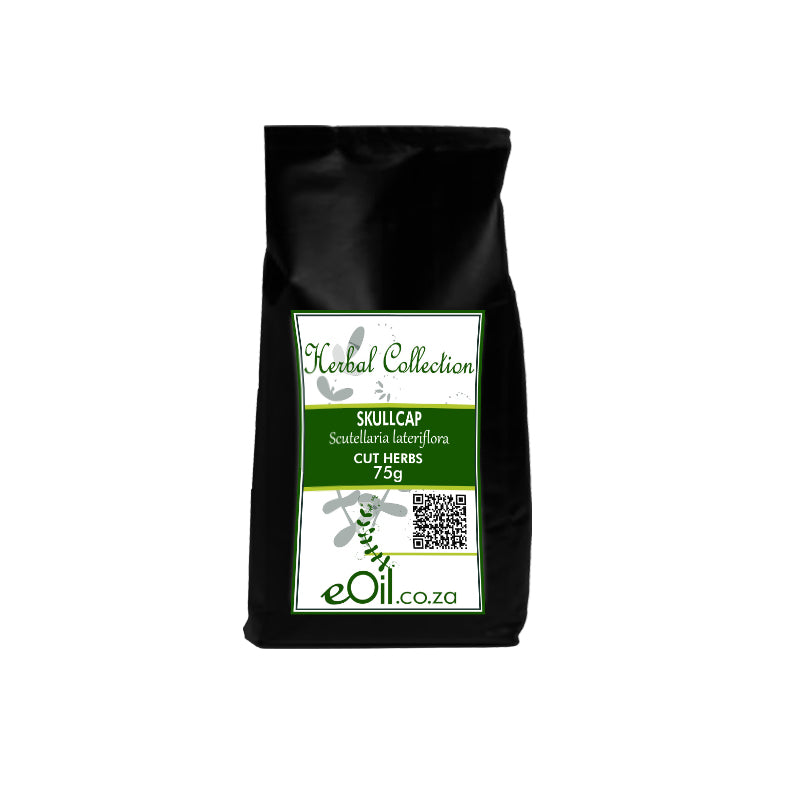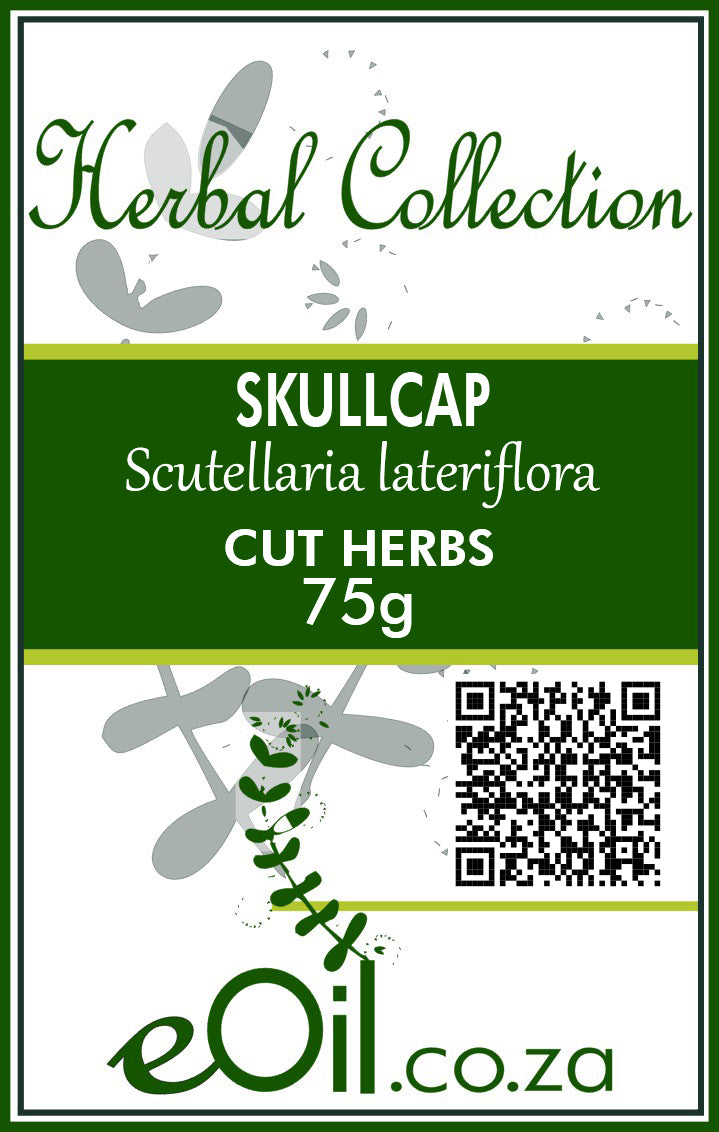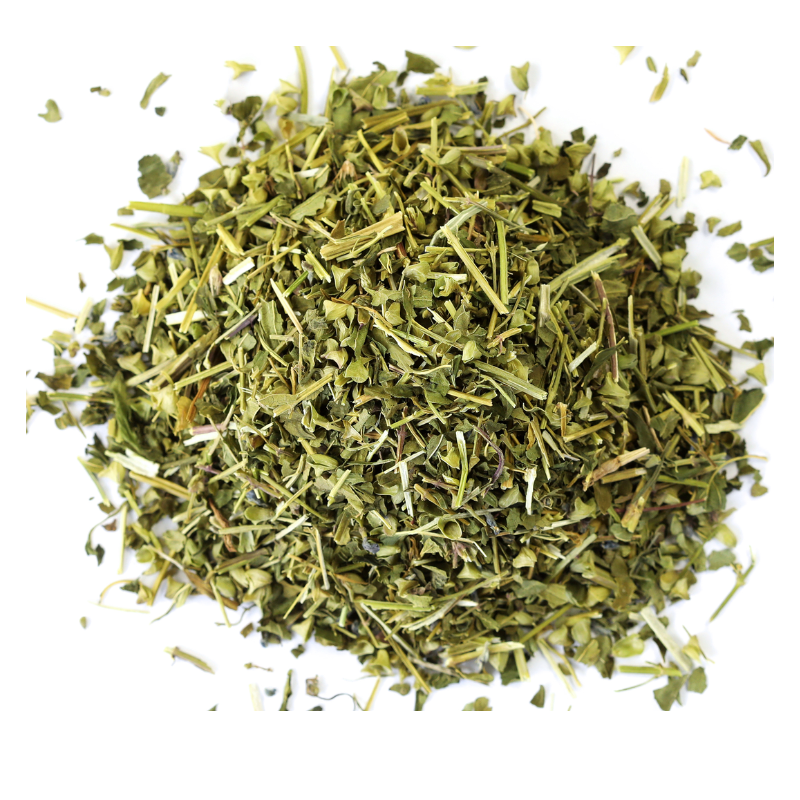Skullcap Herb Dried ( Scutellaria lateriflora ) - Herbal Collection
Skullcap Herb Dried ( Scutellaria lateriflora ) - Herbal Collection - 75 GR is backordered and will ship as soon as it is back in stock.
Description
Description
Blue Skullcap scullcap Herb Dried (Scutellaria lateriflora) - 75 g - Herbal Collection
TRADITIONALLY USED FOR
May help with
- anxiolytic
- neuroprotective
- muscle relaxer
- anxiety
- depression
- muscle tension
- nervous fatigue
- neurodegenerative problems
Tea/Infusion
The most traditional preparation involves steeping 1-2 teaspoons of dried skullcap leaves in one cup of boiling water for 10-15 minutes. This can be consumed up to three times daily. For stronger therapeutic effects, herbalists recommend a more concentrated preparation using half an ounce (14 grams) of recently dried leaves steeped in half a pint of boiling water.
Skullcap (Scutellaria spp.) is a herb traditionally used by Western herbalists for conditions related to nervous tension, including tremors and muscle spasms, often associated with anxiety or nervous system overactivity.
Skullcap and Tremor Support
- Skullcap is valued as a "nervine" and antispasmodic, commonly chosen by herbalists for individuals experiencing tremors, muscle twitching, or spasms that worsen with anxiety or stress.
- Both Western and traditional Chinese herbalism include skullcap as a calming remedy for involuntary movements—sometimes in combination with valerian or other calming herbs.
- While there are many historical and practitioner-based reports suggesting skullcap may offer relief for stress-related or essential tremors, clinical research is limited, and most modern evidence is anecdotal or based on practitioner experience rather than large-scale trials.
- Dosage and duration are described in traditional sources (e.g., tea, tincture, capsules), but effects may require consistent use over time rather than a single dose.
What Individuals Seek from Skullcap
People who ask about skullcap for tremor often:
- Are interested in support alongside medical care for essential tremor, muscle spasms, or anxiety-aggravated tremors.
- Want a gentle, generally well-tolerated herbal option with a reputation for calming nerves, sometimes to avoid side effects of conventional medications.
- Look for natural approaches to support calm, reduce muscle shakiness, or help with nervous tics, often as part of a holistic regimen.
Key Herb Facts
- Skullcap is typically considered safe (with the usual cautions for high or prolonged use and not during pregnancy).
- Most evidence is anecdotal, from herbal tradition or case studies, not large clinical trials.
- It is important to confirm usage with a qualified healthcare provider, especially if the individual is using other medications or managing chronic neurological issues.
In summary, while there is traditional and practitioner support for skullcap in reducing tremors caused or aggravated by anxiety or muscle tension, contemporary use is driven by individual experience, not strong scientific trials. Most people seeking it are motivated by a desire for gentle, nervous-system-calming support, particularly in the context of stress or anxiety-linked tremors.
INFORMATION
Source : http://www.wikiphyto.org/wiki/Skullcap
Reference on http://www.wikiphyto.org
Translation in English by Google Translate (go to the page of the source linked | on Chrome cellphones go on the 3 dots on the top right and select translate in your preferred language | on laptop right click your mouse and select option translate when hoovering on the page
plant name
American skullcap, scullcap or skullcap in English ( American skullcap )
International Latin denomination
botanical family
Lamiaceae
Description and habitat
- Herbaceous plant native to North America
History and tradition
- Native American medicinal ethnobotanical uses, widely used in North American folk medicine as an anxiolytic
- The aerial parts would have been used by Native Americans during purification rites
- Native Americans used it as a tranquilizer, sedative, nervous system tonic (to promote sleep, calm hysterical attacks and epileptic seizures, and treat various other neurological disorders)
Parts used
- Aerial parts harvested from plants two or three years old
Dosage forms available
- Mother tincture of Scutellaria laterifolia whole plant
Usual dosages
Composition
Main components of the plant
- Flavonoids : baicalin , baicalein (baicalin aglycone ) , scutellarin , scutellarein , wogonin , lateriflorin , ikonnikoside I
- Tannins
- Polysaccharides
- GABA
- Glutamine
- Ascorbic acid
Main components of buds or young shoots
Main components of essential oil
Properties
Plant properties
- Anxiolytic [1] , [2] , [3] , [4] , [5] , by effect on GABA - A [6]
- Neuroprotective (Alzheimer's disease, Parkinson's, depression) [7] , Scutellaria lateriflora improves mitochondrial function and can act favorably on neurodegenerative diseases, neuropsychiatric disorders, and cancer ( flavonoids , bacalein ) [8]
- Inhibition of the formation of alpha-synuclein oligomers in vivo, potentialities in Parkinson's disease ( bacalein , scutellarein ) [9]
- Affinity for serotonin ( flavonoid ) receptors [10]
- Inhibits the development of prion diseases [11]
- Muscle relaxer
- High dose euphoric effects (?)
Bud properties
Properties of essential oil
Indications
Indications of the whole plant (phytotherapy)
- Anxiety, depression, muscle tension, nervous fatigue
- Neurodegenerative diseases, Parkinson [12] (?)
Indications of the bud (gemmotherapy)
Specific indications of essential oil (aromatherapy)
Known or suspected mode of action
Usual formulations
Regulations
Possible side effects and precautions for use
- Suspected hepatotoxicity, but reported cases of poisoning attributed to various species of germander Teucrium chamaedrys [13]
- Chromatography makes it possible to distinguish the species Scutellaria lateriflora and Teucrium canadense or Teucrium chamaedrys [14]
Bibliographic references
- Go↑ Sarris J. Herbal medicines in the treatment of psychiatric disorders: a systematic review. Phytother Res. 2007 Aug;21(8):703-16. PMID 17562566
- Go↑ Sarris J, Panossian A, Schweitzer I, Stough C, Scholey A. Herbal medicine for depression, anxiety and insomnia: a review of psychopharmacology and clinical evidence. Eur Neuropsychopharmacol. 2011 Dec;21(12):841-60. PMID 21601431
- Go↑ Elham Alramadhan, Mirna S. Hanna, Mena S. Hanna, Todd A. Goldstein, Samantha M. Avila,Benjamin S. Weeks. Dietary and botanical anxiolytics. Med Sci Monit. 2012; 18(4): RA40–RA48. texte intégral
- Go↑ Wolfson P, Hoffmann DL. An investigation into the efficacy of Scutellaria lateriflora in healthy volunteers. Altern Ther Health Med. 2003 Mar-Apr;9(2):74-8. PMID 12652886
- Go↑ Brock C, Whitehouse J, Tewfik I, Towell T. American Skullcap (Scutellaria lateriflora): a randomised, double-blind placebo-controlled crossover study of its effects on mood in healthy volunteers. Phytother Res. 2014 May;28(5):692-8. doi: 10.1002/ptr.5044. PMID 23878109
- Go↑ Awad R, Arnason JT, et al. Phytochemical and biological analysis of skullcap (Scutellaria lateriflora L.): a medicinal plant with anxiolytic properties. Phytomedicine. 2003 Nov;10(8):640-9. PMID 14692724
- Go↑ Lohani M, Ahuja M, Buabeid MA, Dean S, Dennis S, Suppiramaniam V, Kemppainen B, Dhanasekaran M. Anti-oxidative and DNA protecting effects of flavonoids-rich Scutellaria lateriflora. Nat Prod Commun. 2013 Oct;8(10):1415-8. PMID 24354189
- Go↑ de Oliveira MR, Nabavi SF, Habtemariam S, Erdogan Orhan I, Daglia M, Nabavi SM. The effects of baicalein and baicalin on mitochondrial function and dynamics: A review. Pharmacol Res. 2015 Oct;100:296-308. doi: 10.1016/j.phrs.2015.08.021. PMID 26318266
- Go↑ Caruana M, Högen T, Levin J, Hillmer A, Giese A, Vassallo N. Inhibition and disaggregation of α-synuclein oligomers by natural polyphenolic compounds. FEBS Lett. 2011 Apr 20;585(8):1113-20. doi: 10.1016/j.febslet.2011.03.046. PMID 21443877
- Go↑ Brock, C., Whitehouse, J., Tewfik, I., & Towell, T. (2010). American skullcap (Scutellaria lateriflora): an ancient remedy for today’s anxiety?. British Journal of Wellbeing, 1(4), 25-30.
- Go↑ Eiden M, Leidel F, Strohmeier B, Fast C, Groschup MH. A Medicinal Herb Scutellaria lateriflora Inhibits PrP Replication in vitro and Delays the Onset of Prion Disease in Mice. Front Psychiatry. 2012 Feb 17;3:9. doi: 10.3389/fpsyt.2012.00009. eCollection 2012. PMID 22363300 texte intégral
- Go↑ Mazio Elizabeth. Comprehensive nutraceutical agent for treatment/ prevention of Parkinson’s disease. Patent Application Publication No:US2007/0116779A1 May 24,2007 United States [1]
- Go↑ Upton, R., & DAyu, R. H. (2012). Skullcap Scutellaria lateriflora L.: an American nervine. Journal of Herbal Medicine, 2(3), 76-96.
- Go↑ Lin, L.‐Z., Harnly, J.M. and Upton, R. (2009), Comparison of the phenolic component profiles of skullcap (Scutellaria lateriflora) and germander (Teucrium canadense and T. chamaedrys), a potentially hepatotoxic adulterant. Phytochem. Anal., 20: 298-306. https://doi.org/10.1002/pca.1127
- Nishikawa, K., Furukawa, H., Fujioka, T., Fujii, H., Mihashi, K., Shimomura, K., & Ishimaru, K. (2000). Phenolics in tissue cultures of Scutellaria. Recent research developments in phytochemistry, 4, 55-60.
CAUTION
Store in a cool, dry place, away from light. Keep tightly closed, away from the reach of Children and pets.
Do not exceed the daily dose.
This product is not intended to prevent or cure any form of illness or disease.
If you are pregnant or nursing ; If you have a medical condition or are in the course of medical treatment ; If you are programmed for theater/operation in the near future, please consult your healthcare practitioner before using this product.
This product cannot replace a varied and balanced diet and a healthy lifestyle.
This product has not been evaluated by the SAHPRA for its quality, safety or intended use.
For More Information please check our General Safety Herbal products Page

Skullcap Herb Dried ( Scutellaria lateriflora ) - Herbal Collection - 75 GR is backordered and will ship as soon as it is back in stock.





